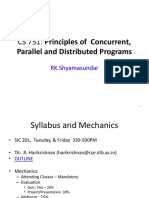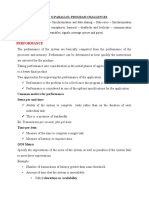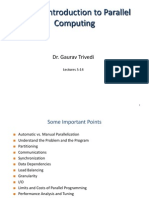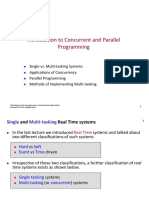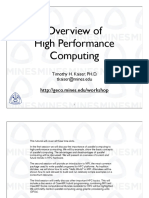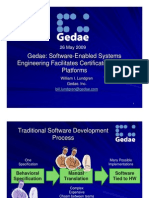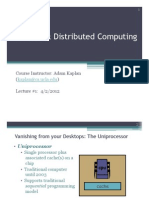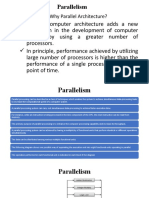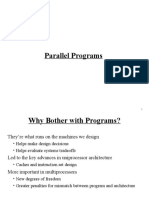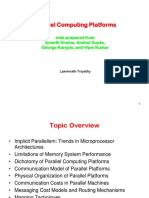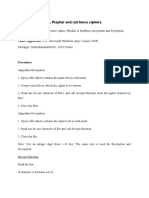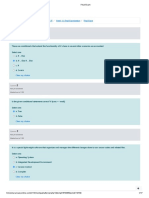CS 286
Two Lecture Introduction
Parallel Processing:
A Hardware Solution
&
A Software Challenge
�Outline
Hardware Solution (Day 1)
Software Challenge (Day 2)
Opportunities
�Key Points from Day 1
Hardware Solution
Parallel Processing is Essentially an Evolution in
Micro- and Macro-Architecture Hardware
That provides a Solution to:
The Heat and Power Wall
The Limitations of ILP
Cost-Effective Higher Performance
HW Paradigm Shift Occurring (esp. Micro-level)
More Cores; Not a Faster Clock or more ILP
�Outline
Hardware Solution
Software Challenge
Technical
Business
Opportunities
�Software Challenge - Technical
Change in Hardware Requires Change in Software
The Car (Hardware) has Changed
From a Sequential Engine To a Parallel Engine
The Driver (Software) Must Change Driving Techniques
Otherwise, Sub-Optimal Performance will Result
Car
&
Driver
Hardware
&
Software
�Software Challenge - Technical
PERFORMANCE
Because HW is going Parallel, so must the SW
in order to get performance gains from HW platform
Multi-core Needs
Parallel Applications
GHz Era
Multi-core Era
TIME
�Software Challenge - Technical
Overview
The Challenge:
Cannot Extract Parallelism Without User Support
The Goal:
Make Parallel Programming the
Mainstream Method for Improving SW Performance
But Parallel Programming is Harder in all Aspects:
Design & Re-engineering
Debugging
Testing
Profiling
Scaling
�Software Challenge - Technical
Design & Re-engineering
Increased Complexity will Require More Careful Analysis
Parallelism Adds Temporal Dimension to Problem
Hard for Humans to Think about Parallel Events
Large Permutation of Operation Interleavings Possible
Increased Programmer Expertise Needed in:
The Application Domain and Algorithms
Source Code Parallelization Techniques
Communication & Synchronization
Performance Optimization
�Code Parallelization Tools
Static Dependency Analyzer: Draws Call-Graph Structure
Dynamic Profile Analyzer: Plots Thread Activity vs. Time
Code Parallelizer: Parallel Language, Paradigm, Compiler
User
Code
Parallelizer
Static
Analyzer
Serial
Parallel
Code
Code
Dynamic
Analyzer
�User Role in Code Parallelization
Run & Interpret Static Data Dependency Analysis
Run & Interpret Dynamic Profile Analysis
Drive Code Parallelizer Transformations
User
Code
Parallelizer
Static
Analyzer
Source
Code
Dynamic
Analyzer
�User Knowledge in Code Parallelization
High-Level Application Code and Algorithms
Low-Level Thread and Communication Profile
Source Code Parallelization & Optimization Techniques
User
Code
Parallelizer
Source
Code
�User Knowledge in Code Parallelization
High-Level Application Code and Algorithms
Low-Level Thread and Communication Profile
Source Code Parallelization & Optimization Techniques
User
Code
Parallelizer
Source
Code
�Goal:
Assist The User
Help User Focus on
the Code with Best
Potential Speedup
Help User Focus on
Relevant Information
from Analyses
Code
Parallelizer
Source
Code
�Ultimate Goals
An Ideal Set of Parallelization Tools Would:
Off-Load User as Much as Possible
Make Parallelization Easier and More Efficient
Maximize Code Performance Gain
Minimize Analysis and Transformation Time
Perform Data Fusion on Static and Dynamic Analysis
Filter, Correlate, and Interpret the Results
Produce Correct, Bug-Free Parallel Code
Increase Degree of Automation
But, Current SW Tools Still Need Further Development
�Software Challenge - Technical
Tools
Lack of Tools Compounds Problem
Existing Tool Chain only for Sequential Programming
Need New Parallel Programming Tools & Infrastructure
Effective Models for Parallel Systems
Constructs to make Parallel Architecture more Visible
Languages to More Clearly Express Parallelism
Reverse Engineering Analysis Tools
To Assist with Conversion of Sequential to Parallel
Especially for Optimized Sequential Code
�Software Challenge - Technical
Race Conditions
Parallelism can Give Rise to a New Class of Problems
Caused by the Interactions Between Parallel Threads
Race Condition:
Multiple Threads Perform Concurrent Access
to the Same Shared Memory Location
Threads Race Against Each Other
Execution order is assumed but cannot be guaranteed
Outcome depends on which one wins (by chance)
Results in Non-Deterministic Behavior
�Software Challenge - Technical
ATM Race Condition Example
Joint Bank
Account
$ 300
1) Check Balance
$300
$300
2) Withdraw $300
�Software Challenge - Technical
Race Conditions
Race Conditions are Especially Hard to Detect & Debug
Errors are Very Subtle
No Apparent Failure Occurs
Program Continues to Run Normally
Program Completes Normally
Errors are Intermittent
Hard to Reproduce and Diagnose
Errors Can Slip Through SQA Testing Process
Potential Lurking Bug
Most Common Error in Parallel Programs
�Software Challenge - Technical
Semaphores
Semaphores Offer a Solution to Race Conditions
However Semaphores themselves can cause Problems:
Introduce Overhead
Can Create Bottlenecks
Mutually Exclusive (one-at-a-time) Access
�Software Challenge - Technical
Deadlock
Another Potential Problem Arising From Parallelism
Deadlock:
Two or More Threads are Blocked because
Each is Waiting for a Resource Held by the Other
Requests
Sem_B
Held by
Thread 1
Thread 2
Held by
Sem_A
Requests
�Software Challenge - Technical
Deadlock
Not as Hard as Race Conditions
Errors are More Obvious
System Usually Freezes
But Similar to Race Conditions
Errors are Intermittent
Hard to Detect, Reproduce, Diagnose, Debug
Errors Can Slip Through SQA Testing Process
Potential Lurking Bug
Another Common Error in Parallel Programs
�Software Challenge - Technical
Concurrent vs. Parallel
Time-Sharing = Multi-Tasking = Multiplexing = Concurrent
One Processor is being shared (switched quickly)
between tasks making them appear to be Concurrent
But its essentially just an illusion, because
at any instant in time, only one task is really executing
Concurrency is not the same as true Parallelism
Concurrent: Two Threads are In Progress at Same Time
vs.
Parallelism: Two Threads are Executing at Same Time
�Software Challenge - Technical
Concurrent vs. Parallel
SW Problem is Harder than that from Time-Sharing Era
Multi-Cores (Micro) & Multi-Nodes (Macro) HW enable:
- Not Just Multi-Tasking or Concurrency, but
- True Parallelism
Potential Problem when migrating Multi-Tasking Code
Consider a SW Application Programmed with Two Tasks:
One task is assigned a low priority; other a high priority
In Multi-Tasking: LP task cannot run until HP is done
Programmer could have assumed Mutual Exclusion
In Parallel System: LP and HP can run at Same Time
�Software Challenge - Technical
Debugging
Harder Because of Intermittent, Non-Deterministic Bugs
Time Sensitive (Temporally Aware) SW Tools Needed
New Parallel Debugging Tools Required
Need to Exert Temporal Control over Multiple Threads
Ideal Debugger would have:
Reverse Execution Capability (cycle-accurate undo)
Instant Replay Capability (w/ accurate time counter)
Cannot Use Ad-hoc Debugging via PRINT Statements
Adds Extra Instructions which could Change Timing
�Software Challenge - Technical
Testing
Simple Code Coverage Metrics Insufficient
e.g.) Just Tracking Statement or Branch Executions
Need to Consider Other Code Executing in Parallel
Want to Test All Possible Instruction Interleavings
Otherwise, Code Would Not Be Fully Exercised
Especially Important to Check Interactions In Time
Race Condition
Deadlock
�Software Challenge - Technical
Performance Profiling and Tuning
Important to Know Which Code (sections) to Optimize
Concentrate on Hot Spots
Harder in Parallel Because Must Consider:
Thread Creation & Synchronization Overhead
Communication to Computation Ratio
Thread Balancing
time
Busy
Idle
�Software Challenge - Technical
Amdahls Law
Parallel Speedup is Limited by the Amount of Serial Code
Maximum Theoretical Speedup from Amdahl's Law
8
Speedup
7
6
%serial= 0
%serial=10
%serial=20
%serial=30
%serial=40
%serial=50
1
0
0
Number of cores
�Software Challenge - Technical
Parallel Scaling
Potentially Negative ROI due to Parallel Overhead
Speedup vs. Degree of Parallelism
Speedup
Degree of Parallelism
�Software Challenge - Technical
Parallel Scaling
Implications of Amdahls Law:
Diminishing Marginal Rates of Return from Parallelism
It will be Hard to get good Parallel Scaling from SW
Eliminating Sequential Code is Important
Even Small Amounts of Serial Execution can
Render a Parallel Machine Ineffective
Applications That Lack Sufficient Parallelism Will Be
Performance Dead Ends
�Software Challenge - Business
Changing Technology Curves is Hard
New Technology Curves Generally Appear Down Right
Cost / Performance vs. Performance
P1
P2
Cost
Performance
P3
Performance
�Software Challenge - Business
Changing Technology Curves is Hard
Never Ride Technology Curve Up into Over-Utilization
Cost / Performance vs. Performance
Sequential
Parallel
Cost
Performance
Performance
�Software Challenge - Business
Changing Technology Curves is Hard
Change (Hop Down Right) to New Tech Curve Instead
Cost / Performance vs. Performance
Sequential
Parallel
Cost
Performance
Performance
�Software Challenge - Business
Changing Technology Curves is Hard
Investment in Training and New Tools Required
Learning Curve for Employees
Entirely New SW Engineering Infrastructure
Design / Re-engineering
Debugging
Testing
Profiling
Scaling
Legacy Code Needs to be Re-engineered for Parallelism
�Key Points
Software Challenge
Parallel Programming is Hard
More Complex
Lack of Tools
New Type of Bugs
Race Conditions
Deadlocks
Harder to Debug, Test, Profile, Tune, Scale
Parallel Programming is a Software Challenge
��Outline
Hardware Solution
Software Challenge
Opportunities
Technical
Business
�Opportunities - Technical
Opportunity to Create New SW Engineering Infrastructure
Better, Smarter Tools for
Design / Re-engineering
Debugging
Testing
Profiling
Opportunity to Re-Invent Entire SW Engineering Field
Algorithms, Languages, Compilers, Processes
Dawn of a New Era
Second Chance (to get it right)
�Opportunities - Technical
The Universe is Inherently Parallel
Natural Physical and Social / Work Processes
Weather, Galaxy Formation, Epidemics, Traffic Jam
Can Leverage Unique Capabilities offered by Parallelism
Add New Features via Separate Parallel Modules
Avoids Re-engineering of Old Module
More Functionality
No Increase in Wall Processing Times
Speculative Computation
Precompute alternatives to Minimize Response Time
e.g.) Video Game Up / Down / Left / Right
More Responsive User Interfaces
�Opportunities - Technical
(Yet) Undiscovered Technical Opportunities
New Parallel Algorithms
Super-Linear Speedups
Parallel Computer has
N times more Memory
Larger % of SW can fit
in upper Levels of
Memory Hierarchy
Divide and Conquer
leverages faster Mems
An Important Reason for
using Parallel Computers
�Opportunities - Business
High Performance Computing (HPC)
Cloud and Parallel Processing Makes HPC Ubiquitous
New Applications Become Possible
Personalized Drugs (Genetic & Molecular Profiling)
Stream Computing (Real-Time Analytics)
Smarter Applications Become Possible
Virtual Assistants
Efficiency Becomes Possible
High-Fidelity Simulations
e.g.) Car Safety Tests
����Opportunities - Business
�Opportunities - Business
High Performance Computing (HPC)
Grand Challenges Become Possible
Grand Challenge was Defined by Wilson in 1987:
Fundamental Problem in Science or Engineering
Has Potentially Broad Economic and Scientific Impact
Could be Advanced with HPC Resources
Grand Challenge 3T Goal:
1 TeraFlop/second of Processor Power
1 TeraByte of Main Memory
1 TeraByte/second of I/O Bandwidth
�Opportunities - Business
High Performance Computing (HPC)
Examples of Grand Challenges
Data Mining and Fusion
Hurricane Prediction
Global Warming
World Hunger
Cure for Serious Diseases
�Opportunities - Business
New Capabilities to Benefit Mankind
�Opportunities - Business
New Capabilities to Entertain Mankind
. Maybe even OutSmart Mankind
�Opportunities - Business
Corporate & National Competiveness
�Opportunities - Business
Visualization
Assist in the Interpretation of Massive Data Sets.
For example, a 5 day weather forecast of the
continental U.S. would produce 10 terabytes
No one can look at that many numbers,
But a Picture is worth a Thousand Words.
And a Movie or Animation is worth a Million Words.
Time-lapse simulation of Global Warming
Humans can detect and interpret high-level visual
Patterns even better than a computer can today.
��Example Visualization:
Weather Forecast
�Example Visualization:
Structure of the Universe
�Opportunities - Business
�Opportunities Business
Meeting Peoples Expectations
About Multitasking Capabilities
Apple
iPad
Jan 2010
There's no multitasking. "Are you saying I can't listen to Pandora
while writing a document? I can't have my Twitter app open at the
same time as my browser? I can't have AIM open at the same
time as my email? Are you kidding me? This alone guarantees
that I will not buy this product," Gizmodo's Adam Frucci writes.
�The World is Moving Towards
Parallel Processing On The Cloud
The Cloud Offers Even More Opportunities
�Opportunities - Business
Ubiquitous HPC via Cloud
HPC on Mobile Devices Possible
CloneCloud (Berkeley Research Labs)
Clone Smartphone in Cloud
- Off-load Compute-Intensive tasks
- Conserve Mobile Device Battery Life
Fusion Render Cloud for Mobile Gaming (AMD)
Cloud Computes Game Graphics and Compresses it
Mobiles Computation Simplified to Decompression
�Using Parallel Programming,
You Can Reach The Clouds
And The Sky is The Limit !
�Wondering about Parallel Programming?
Plan to Read Entire MCP Book, *Except* for:
- Skip Ch. 5
- Read only the first part of Ch. 8 (up to 219)
- Read only the first part of Ch. 10 (up to 265)
- Only Skim Ch. 11


